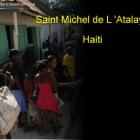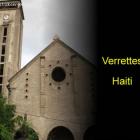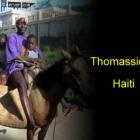ADVERTISEMENT
writer - Haiti Observer Blog
writer, Haiti Observer Blog. Read the following articles about writer
Paul Arcelin, Haitian Teacher, Writer
Paul Arcelin, a Haitian by birth, lived in exile in Canada during Duvalier's dictatorship regime. He married a Canadian woman with who he had 2 children. After Duvalier's fall in 1986, Arcelin was offered to become General William Regala's Special Adviser. He also served as Haitian Ambassador to Dominican Republic during the rule of Avril government. Paul Arcelin also went up against Jean Bertrand-Aristide and along with Guy Philippe, he played a very crucial role in Haitian rebellion of 2004. It was during this rebellion that Paul Arcelin was interviewed a few times. All his interviews are today available with Radio Canada.
Haitian born neurologist, playwrighter, poet and novelist Jean Metellus
Jean Metellus is a Haitian born neurologist, a playwright, a poet and novelist. He was born in Jacmel, Haiti on April 30, 1937. He completed his education in Republic of Haiti and later became a teacher. He escaped Duvalier's dictatorship by fleeing to Paris in 1959. In Paris he studied medicine and linguistics and obtained specialization in neurology. Jean was a gifted poet by birth and wrote several poems. He sent his poems to ethnologist Michel Leiris who then advised him to send his poemes to Maurice Nadeau who as Les Lettres Nouvelles editor. Jean also sent his poems to Jean-Paul Sartre. Jean Metellus' poems were published by Maurice Nadeau in Les Lettres Nouvelles and by Jean-Paul Sarte in Les Temps Modernes. Both these publications were made in July 1969.
Lylah M. Alphonse, Indian Haiti news editor
She is born of a Persian mother from India and a father from Haiti. Lylah M. Alphonse is an American citizen who has achieved a great deal of chances to better herself. She is a renowned writer who has spent the better part of her life writing and editing work at newspaper stations and magazines. She is also a very much known person in The Boston Globe newspaper in Boston, Massachusetts where she writes a couple of sections at the Sunday magazine, writes for some of their Travel, Food and Living/Arts sections.
Antenor Firmin's Contributions to Bioanthropology
Cap-Haitien-born Anténor Firmin was one of the earliest scholars to write on the subject of negritude. Conceivably the first anthropologist of color, he introduced the notion of human anthropology as allied with the study of racial characteristics.
During the late 1800s, a strain of thinking pervaded U.S. and European intellectual circles, arguing the African race as low on the evolutionary scale in comparison to Caucasians. The French were dominating the conversation of the African race as intellectually inferior, due to misguided assumptions of racial differences. A prominent French author, Count Arthur de Gobineau, published "Essay on the Inequality of Human Races" that posited supremacy of the Aryan people over Africans and other dark-skinned races.
Petion Savain, Haitian painter, journalist and published author
Becoming Haiti's first recognized painter was undoubtedly no small feat to Petion Savain. Born in February of 1906, he didn't start seriously painting until 1927, having spent his life and time before teaching tin smithing, cabinet making and wrought iron at the same vocational school. He'd also had an interest in photography and reportedly dabbled in painting, having studied some drawing at school.
It was a brush with American painter, William Edouard Scott, in Haiti in 1930 to paint, that sparked Savain's lasting interest in the field he would be most remembered for. It is said he then taught himself to paint and created a style which would be copied by many later admirers. A Savain painting, recognizable by its distinct purples and pinks, or by the semi-circular or triangular aspects of crouched or sitting figures, is an uncommon luxury to own.
Vyewo, written by Koralen Jean-Claude Martino (Coralin)
The poignant song by Koralen Jean-Claude Martino, arguably most famously sung by Manno Charlemagne, speaks to the melancholy horrors of Haitians' second instance of being sold into slavery, by the United States during their first occupation of the country, between 1914 and 1934.
Strung together by notes of a minor influence, with lyrics that invoke the despondency of those experiencing life as the Vyewo, sold to work on sugar plantations in neighboring countries, the mainly somber melody is interspersed with contrastingly allegro moments, creating an empathetic understanding, even in those who do not understand the language sung.
Our objective is to share with you news and information about Haiti and the people of Haiti. Traditions, habits and the way we were or grew are alive in this site. We highly recommend that you Subscribe to our Newsletter and also share with us some of the things that are memorable and made us unique people.

 Saint Michel de L 'Atalaye
Saint Michel de L 'Atalaye  Verrettes, Haiti
Verrettes, Haiti  Haitian Thanksgiving
Haitian Thanksgiving  Haitians are a Proud People
Haitians are a Proud People  Thomassique, Haiti
Thomassique, Haiti